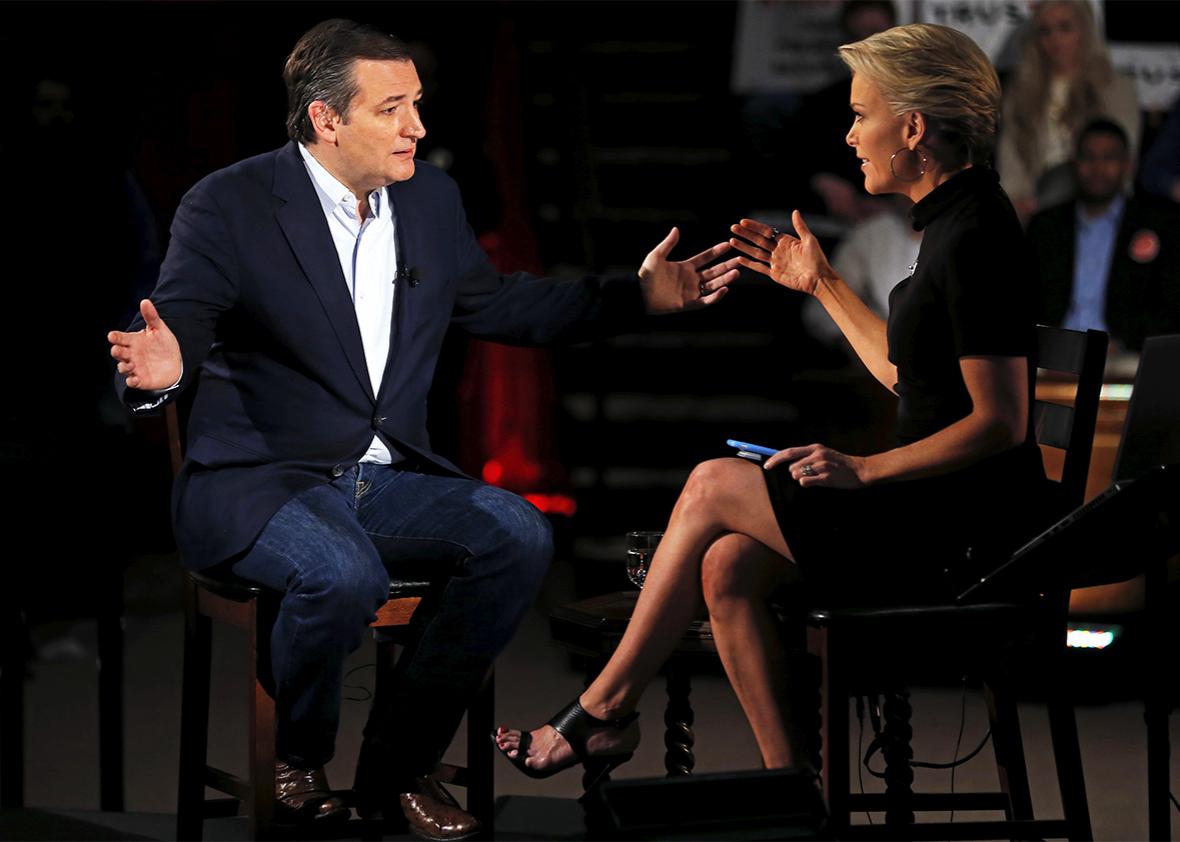MADISON, Wisconsin—Ted Cruz has some disappointing news for establishment Republicans, who he still believes perceive him as the ultimate enemy. “This fevered pipe dream of Washington, that at the convention they will parachute in some white knight who will save the Washington establishment: It is nothing less than a pipe dream,” the senator said Monday. “It ain’t gonna happen. If it did, the people would quite rightly revolt.”
It’s interesting that Cruz is still arguing against the establishment. In recent days, after all, heading into the Wisconsin primary, he has taken to bragging about the breadth of his Republican support. He is quite aware that he’s the anti-Trumpers’ last best chance, even if some of those anti-Trumpers don’t like him.
“Of those 17 original [Republican presidential candidates],” Cruz told reporters on Monday before taping a Fox News town hall with Megyn Kelly, “five are supporting this campaign: Rick Perry, Lindsey Graham, Jeb Bush, Carly Fiorina, and Wisconsin’s own Gov. Scott Walker. When you add to that Sen. Mike Lee and [radio host] Mark Levin, you’ve got the full spectrum of the Republican Party.”
And if you’ve got the full spectrum of the Republican Party in your pocket, that’s going to include the establishment. This does not mean, however, that Cruz is willing to abandon the anti-establishment rhetoric that’s gotten him so far.
Though the Cruz campaign has repeatedly called for John Kasich to drop out of the race, the Ohio governor provides a useful foil for Cruz. Kasich’s continued candidacy represents the treacherous possibility of a moderate, establishment candidate taking over at the convention. Arguing against such a coup is useful to Cruz rhetorically—even when he claims that Kasich’s name will never make it to the convention floor.
“There are only two candidates whose names will appear on the ballot [at the convention]: Donald Trump and myself,” Cruz said. “Under the rules you have to have won eight states; there are only two candidates who will have met that threshold.” He’s referring to Rule 40 of the convention rules, established ahead of the 2012 convention to block Ron Paul’s name from being considered. The Cruz and Trump camps will control a vast majority of allocated delegates going into the convention—80 percent, Cruz estimates—and, thus, a vast majority of the delegates on the rules committee. Both campaigns have said they would try to keep the rule on the books to block consideration of Kasich or a Paul Ryan–esque “white knight” candidate.
“The nice thing is, Washington doesn’t control what happens,” Cruz said, “the delegates control what happens, and the delegates are elected by the people.” The 2012 rules shouldn’t be changed “because Washington has been unhappy with how the people are voting.”
“Now that the rule is viewed as inconvenient to the Washington establishment, they want to get rid of it,” he added. “But you know what? What’s good for the goose is good for the gander. If you want to win, win at the ballot box.” And during the town hall with Kelly, he made the criticism against Kasich, at least, more explicit: “If you lose 49 states, you cannot be the nominee.”
The problem with Cruz portraying himself as the main outsider, man-of-the-people candidate whom the establishment would be angling to screw over at the convention is that he’s not. That would be Donald Trump. Here there is some conflict in Cruz’s position. When the idea of Kasich or a “white knight” being considered at the convention comes up, Cruz says that would be a ridiculous rejection of the people’s will. But when he’s asked about whether the leading vote-, state-, and delegate-winner of the contest should have the inside track to the nomination, Cruz demurs, saying the delegates can do whatever they want.
Since Cruz’s and Trump’s loyalists will control the rules committee, it’s likely that they will have the ability to keep the race as a contest between himself and Trump. In that case, Cruz will officially be the establishment preference, and his competition will be the leading delegate-getter of the primaries. The “people” might “quite likely revolt” over that, too.
